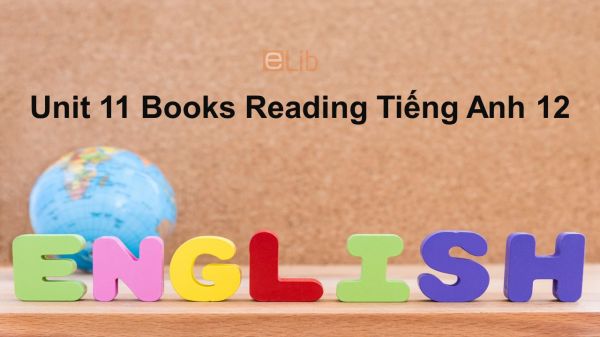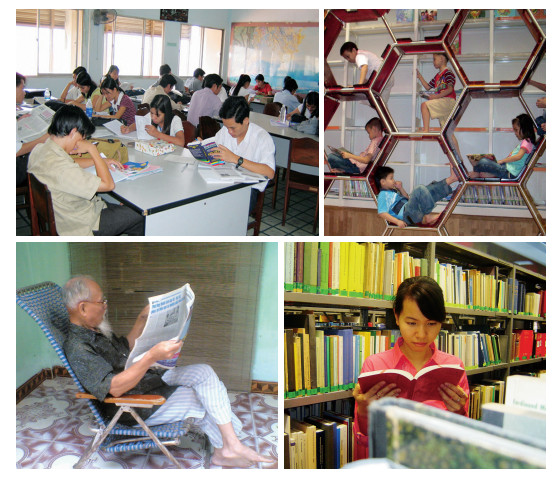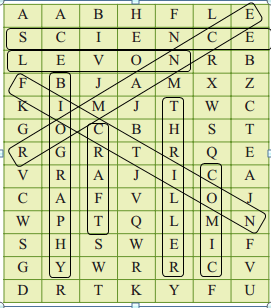Unit 11 lớp 12: Books-Reading
Bài học Unit 11 Lớp 12 Books phần Reading giúp các em bổ sung vốn từ vựng liên quan đến mức độ đọc sách của mọi người trong thời đại công nghệ thông tin diễn ra như thế nào? Cách đọc sách của mỗi người có gì khác nhau và những lợi ích không ngờ của việc đọc sách thường xuyên mang đến cho mọi người như thế nào.
Mục lục nội dung

1. Before You Read Unit 11 lớp 12
Work in pairs. Ask each other the following questions (Làm việc theo cặp. Hỏi nhau những câu hỏi sau)
1. Do you often read books? (Bạn có thường đọc sách không?)
Yes, I do. (Có)
2. What kind of books do you enjoy reading most/least? (Bạn thích/ ít thích đọc loại sách gì nhất?)
I enjoy reading comic books, but I hate novel. (Tôi thích đọc truyện tranh nhất, nhưng tôi ghét tiểu thuyết.)
3. How do you read books? (Bạn đọc sách như thế nào / theo cách nào?)
I generally scan its content first to see if there are any interesting ideas. Then if I have more time, I read the preface. After that I find time to read it, a few pages a time. (Đầu tiên tôi nhìn qua mục lục để xem có ý tưởng nào hay không. Sau đó nếu tôi có nhiều thời gian hơn, tôi sẽ đọc phần giới thiệu ở đầu sách. Sau đó nếu có thời gian để đọc, tôi đọc mỗi lúc một vài trang.)
2. While You Read Unit 11 lớp 12
Read the text and do the tasks that follow (Đọc đoạn văn và làm các bài tập theo sau)
On the subject of reading, Francis Bacon, who lived at about the same time as Shakespeare, wrote these words, “Some books are to be tasted, others to be swallowed, and some few to be chewed and digested.” This good advice shows how it is possible to read different types of books in different ways. For example, you might pick up a travel book and read a few pages before going to sleep. It is enough to dip into it and read bits here and there. In a word, this is “tasting”.
Some stories are for “swallowing”. Imagine that you have found a good story, and, what is even more important, the time to enjoy it. You might be on holiday, or on a long train journey. If it is a good book, you might say, “It’s so good I can’t put it down.” But not all stories belong to this class. Reviewers sometimes describe books as “hard-to-put- down”, or “hard-to-pick-up-again”.
Other books are for reading slowly and carefully. If it is a book on a subject that you are interested in, you will want to “chew and digest it”. That does not mean reading it too slowly. When you pick up a book for the first time, check that it is not too difficult. Do not start a book unless you can see from the first few pages that it is one you can easily read and understand.
Some people think that as more and more people have television in their homes, fewer and fewer people will buy books to read. Why read when television can bring you all the information and stories with colour, picture and action? But, in fact, television has not killed reading. Today, more books of every kind are sold than ever before. Books are still a cheap way to get information and entertainment, and you can keep a book forever and read it many times. Books in the home are a wonderful source of knowledge and pleasure.
Tạm dịch
Bàn về việc đọc sách, Francis Bacon, người sống cùng thời với nhà văn Shakespeare, đã viết như sau "Một số sách cần đọc qua loa, một số khác cần đọc ngốn ngấu, một số ít cần phải nghiền ngẫm và suy ngẫm". Lời khuyên hay đó chỉ ra các cách khác nhau để đọc những loại sách khác nhau. Chẳng hạn, bạn có thể lấy một quyển sách về du lịch và đọc vài trang trước khi đi ngủ. Quyển đó chỉ để cho bạn ghé mắt vào và đọc chút ít chỗ này chỗ nọ. Nói tóm lại, chỉ là đọc qua loa mà thôi.
Vài quyển truyện thì để đọc ngốn ngấu. Cứ tưởng tượng bạn vừa tìm được quyển truyện hay, và quan trọng hơn nữa là bạn có thì giờ để thưởng thức nó. Có thể bạn đang đi nghỉ hay đang trên tàu hỏa cho một chuyến đi dài. Nếu đó là quyển sách hay, bạn có thể nói "quyển này hay tới nỗi tôi không đặt nó xuống được", nhưng không phải sách truyện nào cũng thuộc loại này. Các nhà phê bình văn học đôi khi mô tả sách là "khó mà đặt xuống" hay "khó có thể cầm lên lại được".
Có những quyển sách phải đọc chậm rãi và cẩn thận. Nếu đó là quyển sách về chủ đề bạn ưa thích thì bạn sẽ muốn "nghiền ngẫm và suy ngẫm" nó. Điều đó không có nghĩa là bạn phải đọc thật chậm. Khi cầm một quyển sách lên lần đầu tiên, bạn phải kiểm tra để biết chắc là nó không quá khó đọc. Đừng bắt đầu đọc một quyển sách mà không xem qua vài trang đầu để biết bạn có thể đọc và hiểu nó dễ dàng không.
Một số người nghĩ là khi càng nhiều người có tivi ở nhà thì số người mua sách sẽ càng ít đi. Tại sao phải đọc sách khi vô tuyến truyền hình có thể mang đến cho bạn tất cả thông tin và các câu truyện với màu sắc, hình ảnh sống động? Thế nhưng, thật ra, tivi không giết chết thú đọc sách. Ngày nay, sách các loại được bán nhiều hơn bao giờ hết. Sách vẫn là một cách ít tốn kém để có thông tin và giải trí, và bạn lại có thể cất giữ sách và đọc lại nhiều lần. Sách ở nhà chính là một nguồn kiến thức và vui thú tuyệt vời.
2.1. Task 1 Unit 11 lớp 12
The following words and phrases all appear in the passage. Find the Vietnamese equivalent for each of them (Tất cả những từ và cụm từ xuất hiện ở đoạn văn. Tìm từ tiếng Việt tương đương cho mỗi từ)
1. swallow: đọc ngốn ngấu
2. dip into: đọc lướt qua
3. taste: đọc thử, đọc qua loa
4. "hard-to-pick-up-again": khó có thể cầm lên lại
5. digest: đọc và suy ngẫm
6. chew: nghiền ngẫm
7. "hard-to-put-down": không thể đặt xuống
2.2. Task 2 Unit 11 lớp 12
Work in pairs. Decide whether the statements are true (T) or false (F) or not mentioned (NM) in the reading passage. Tick (✓) the appropriate box. (Làm việc theo cặp. Xác định xem các phát biểu sau là đúng (T) hay sai (F) hay chưa được đề cập đến (NM) trong bài đọc. Tích dấu vào ô thích hợp.)
T F NM
.png)
.png)
.png) 1. You can't read different types of books in the same way. (Bạn không thể đọc nhiều thể loại sách trong cùng một cách.)
1. You can't read different types of books in the same way. (Bạn không thể đọc nhiều thể loại sách trong cùng một cách.)
.png)
.png)
.png) 2. When you "taste" a book you read it carefully from the beginning to the end. (Khi bạn đọc qua một quyển sách bạn đọc nó cẩn thận từ đầu đến đoạn kết.)
2. When you "taste" a book you read it carefully from the beginning to the end. (Khi bạn đọc qua một quyển sách bạn đọc nó cẩn thận từ đầu đến đoạn kết.)
.png)
.png)
.png) 3. Many people only have time to read when they are travelling. (Nhiều người chỉ có thời gian đọc khi họ đang di chuyển.)
3. Many people only have time to read when they are travelling. (Nhiều người chỉ có thời gian đọc khi họ đang di chuyển.)
.png)
.png)
.png) 4. Books with good stories are often described as "hard-to-put-down". (Những quyển sách với những câu chuyện hay thường được miêu tả như là “khó mà đặt xuống được”.)
4. Books with good stories are often described as "hard-to-put-down". (Những quyển sách với những câu chuyện hay thường được miêu tả như là “khó mà đặt xuống được”.)
.png)
.png)
.png) 5. Television has replaced books altogether. (Ti vi đã hoàn toàn thay thế sách.)
5. Television has replaced books altogether. (Ti vi đã hoàn toàn thay thế sách.)
Guide to answer
1. NM
2. F
3. NM
4. T
5. F
2.3. Task 3 Unit 11 lớp 12
Answer the questions according to the information in the passage (Trả lời câu hỏi dựa theo thông tin trong đoạn văn)
1. How many ways of reading are there? (Có bao nhiêu cách đọc sách?)
⇒ There are three. (Có 3 cách.)
2. When might you "swallow" a book? (Khi nào người ta "đọc ngốn ngấu" một quyển sách?)
⇒ When you find a good story and have time to enjoy it. (Khi bạn tìm thấy một câu chuyện hay và có thời gian thưởng thức nó.)
3. What should you do before starting to read a book carefully and slowly? (Ta nên làm gì trước khi bắt đầu đọc một quyển sách một cách kỹ lưỡng và chậm rãi?)
⇒ Read a few pages to see if it's the one you can read and understand it easily. (Xem qua vài trang đầu để biết bạn có thể đọc và hiểu nó dễ dàng không.)
4. What are the advantages of television over books? (Đâu là ưu điểm của truyền hình khi so sánh với sách?)
⇒ Televisions can bring you the information and stories with colour, pictures and actions. (Vô tuyến truyền hình có thể mang đến cho bạn tất cả thông tin và các câu truyện với màu sắc, hình ảnh sống động.)
5. What are the advantages of books over television? (Đâu là ưu điểm của sách khi so sánh với truyền hình?)
⇒ Books are still a cheap way to get information and entertainment. And moreover you can keep a book forever and read it at any time and again and again. (Sách vẫn là một cách ít tốn kém để có thông tin và giải trí. Và hơn nữa, bạn lại có thể cất giữ sách và đọc lại nhiều lần và bất kì lúc nào.)
3. After You Read Unit 11 lớp 12
Work in pairs or groups. Find the names of types of books in the square. The word may go across, down, up, backwards, or at an angle . Here are some clues (Làm việc theo cặp hoặc nhóm. Tìm tên của các loại sách trong hình vuông. Các từ có thể nằm ngang, dọc, lên, ngược, hoặc xiên. Đây là một vài gợi ý)
a. Thriller (Rùng rợn)
b. Romance (Tình cảm)
c. Novel (Tiểu thuyết)
d. Science (Khoa học)
e. Craft (Thủ công)
f. Fiction (Tiểu thuyết hư cấu)
g. Comic (Truyện tranh)
h. Bography (Tự truyện)
4. Practice Task 1
Read the passage carefully and choose the correct answer (Đọc đoạn văn cẩn thận và chọn câu trả lời đúng)
It is often said that books are always a good friends and reading is an active mental process. Unlike TV, books make you use your brain. By reading, you think more and become smarter. Reading improves concentration and focus. Reading books takes brain power. It requires you to focus on what you are reading for long periods. Unlike magazines, Internet posts or e-Mails that might contain small pieces of information. Books tell the whole story". Since you must concentrate in order to read, you will get better at concentration. Many studies show if you do not use your memory; you lose it. Reading helps you stretch your memory muscles. Reading requires remembering details, facts and figures and in literature, plot lines, themes and characters.
Reading is a good way to improve your vocabulary. Do you remember that when you were at elementary school you learned how to infer the meaning of one word by reading the context of the other words in the sentence? While reading books, especially challenging ones, you will find yourself exposed to many new words.
Reading is a fundamental skill builder. Every good course has a matching book to go with it. Why? Because books help clarify difficult subjects. Books provide information that goes deeper than just classroom discussions By reading more books you become better informed and more of an expert on the topics you read about. This expertise translates into higher self-esteem. Since you are so well-read, people look to you for answers. Your feelings about yourself can only get better.
Books give you knowledge of other cultures and places. The more information you have got, the richer your knowledge is. Books can expand your horizons by letting you see what other cities and countries have to offer before you visit them.
1. Books have great influence on ________.
a. TV b. friendship c. brain d. muscles
2. When you are reading a book, ________.
a. you have to read small pieces of information
b. you use your brain in concentration and focus
c. you have to read during a very long time
d. you lose your memory
3. A challenging book ________.
a. helps you to improve your vocabulary
b. is only for primary pupils
c. can translate all new words
d. contains a lot of difficult vocabulary
4. Books ________.
a. are compulsory in every course
b. are not needed in most of course
c. contain less information than class discussions
d. make a sick patient feel better
5. Books cannot give you ________.
a. knowledge b. information c. self-esteem d. muscles
5. Practice Task 2
Fill in each numbered blank with one suitable word or phrase (Tìm từ hay cụm từ thích hợp để điền vào chỗ trống)
When a child learns to read and write, he must access the schema developed in his (1) ______. As he reads, the child creates pictures in his mind and uses (2) _____ and points of reference to put the story (3) ____. Television images do not go through a complex symbolic transformation. The mind does not have to decode and manipulate during the television experience. Watching television and playing video games do not (4) ______ a child's skills in word recognition, decoding, vocabulary, spelling or high-level thinking. The connection between television's effects (5) ______ children's reading abilities and the (6) ______ in their writing skills is clear: there is no question in the minds of educators that a student who cannot read with the true comprehension will never learn to write well. Writing, after (7) ______, is book talk, and you only learn book talk by reading. It has been shown that reading stimulates brain activity. While reading, we imagine settings, characters and we become part of the world of the story. (8) ______, it has been shown that watching television prevents brain activity. Children who watch too much television are less socially developed and have problems maintaining (9) ______. Reading, (10) ______ of watching television, enriches our lives, develops the imagination, and intellect, and is less brain deadening. Reading is good for us, it makes one a better person.
6. Conclusion
Qua bài học này các em cần lưu ý một số từ vựng liên quan tới sách và những cách thưởng thức sách như sau
- swallow: đọc ngốn ngấu
- dip into: đọc lướt qua
- taste: đọc thử, đọc qua loa
- "hard-to-pick-up-again": khó có thể cầm lên lại
- digest: đọc và suy ngẫm
- chew: nghiền ngẫm
- "hard-to-put-down": không thể đặt xuống


